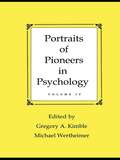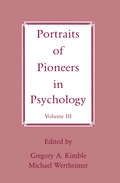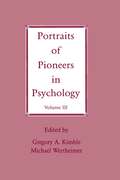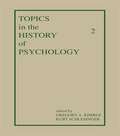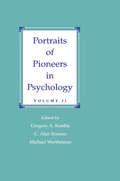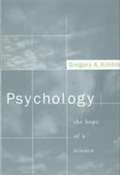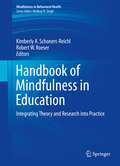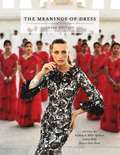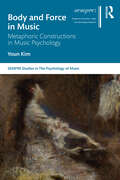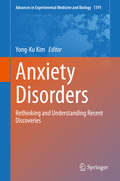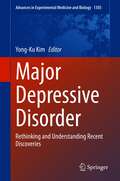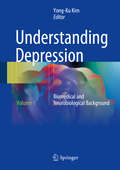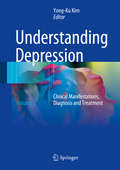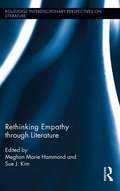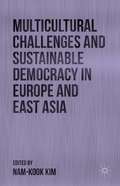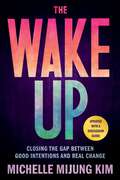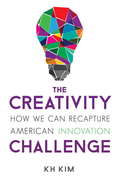- Table View
- List View
Portraits of Pioneers in Psychology: Volume IV (Portraits Of Pioneers In Psychology Ser.)
by Gregory A. Kimble Michael WertheimerThis fourth book in the series continues the tradition of the popular earlier volumes by offering lively and entertaining information about some of contemporary psychology's most illustrious ancestors. The 21 chapters, many of them written by today's most visible and eminent authors, concentrate on the lives and achievements of major psychologists from a variety of areas. Created for undergraduate and graduate courses in the history of psychology, the variety of pioneers represented provide enough flexibility to also use it as a supplemental reader in other psychology courses. Each of the five volumes in this series contains different profiles thereby bringing more than 100 of the pioneers in psychology more vividly to life.
Portraits of Pioneers in Psychology: Volume V
by Gregory A. Kimble Michael WertheimerThis book offers glimpses into the personal and scholarly lives of 20 giants in the history of psychology. As in the earlier volumes, prominent scholars were invited to prepare chapters on a pioneer who had made important contributions in their own area of expertise. Some of the psychologists described may be the teachers of the instructors who will be the users of this book, potentially providing a personal connection of the pioneers to the students. A special section provides brief portraits of the editors and authors, containing interesting information about the relationship between the pioneers and the psychologists who describe them. Utilizing an informal, personal, sometimes humorous, style of writing, the book will appeal to students and instructors interested in the history of psychology. Each of the five volumes in this series contains different profiles thereby bringing more than 100 of the pioneers in psychology more vividly to life.
Portraits of Pioneers in Psychology: Volume III (Portraits Of Pioneers In Psychology Ser.)
by Gregory A. Kimble Michael WertheimerThis third volume in a series devoted to luminaries in the history of psychology--features chapter authors who are themselves highly visible and eminent scholars. They provide glimpses of the giants who shaped modern cognitive and behavioral science, and shed new light on their contributions and personalities, often with a touch of humor or whimsy and with fresh personal insights. The animated style, carefully selected details, and lively perspective make the people, ideas, and controversies in the history of psychology come alive. The fields touched on in this and other volumes cover all of the subfields of psychology. As such, all volumes of Portraits of Pioneers in Psychology will be of interest to psychologists, as well as scholars in related fields. The resourceful teacher could use a selection of chapters as supplementary readings to enhance almost any course in the discipline. The major purpose of these books is to provide source materials for students and their teachers in undergraduate and graduate courses in the history of psychology. Each of the five volumes in this series contains different profiles thereby bringing more than 100 of the pioneers in psychology more vividly to life.
Portraits of Pioneers in Psychology: Volume III (Portraits Of Pioneers In Psychology Ser.)
by Gregory A. Kimble Michael WertheimerThis third volume in a series devoted to luminaries in the history of psychology--features chapter authors who are themselves highly visible and eminent scholars. They provide glimpses of the giants who shaped modern cognitive and behavioral science, and shed new light on their contributions and personalities, often with a touch of humor or whimsy and with fresh personal insights. The animated style, carefully selected details, and lively perspective make the people, ideas, and controversies in the history of psychology come alive. The fields touched on in this and other volumes cover all of the subfields of psychology. As such, all volumes of Portraits of Pioneers in Psychology will be of interest to psychologists, as well as scholars in related fields. The resourceful teacher could use a selection of chapters as supplementary readings to enhance almost any course in the discipline. The major purpose of these books is to provide source materials for students and their teachers in undergraduate and graduate courses in the history of psychology. Each of the five volumes in this series contains different profiles thereby bringing more than 100 of the pioneers in psychology more vividly to life.
Topics in the History of Psychology: Volume II
by Gregory A. Kimble Kurt SchlesingerFirst published in 1985. At one end of historical time scale, speculations about psychological processes go back to classical Greek philosophy and beyond. For centuries thereafter, the treatment of psychological subject matter remained largely in the domain of other disciplines, especially philosophy, where it became inextricably interwoven with epistemology. The chapters of this book glance only briefly at these philosophical antecedents, to review the basic concepts and principles that early investigators were to take for granted. They tend then to move to the end of the last century when the systematic study of psychological processes began.
Topics in the History of Psychology: Volume I
by Gregory A. Kimble Kurt SchlesingerFirst published in 1985. At one end of historical time scale, speculations about psychological processes go back to classical Greek philosophy and beyond. For centuries thereafter, the treatment of psychological subject matter remained largely in the domain of other disciplines, especially philosophy, where it became inextricably interwoven with epistemology. The chapters of this book glance only briefly at these philosophical antecedents, to review the basic concepts and principles that early investigators were to take for granted. They tend then to move to the end of the last century when the systematic study of psychological processes began.
Portraits of Pioneers in Psychology: Volume II
by Gregory A. Kimble C. Alan Boneau Michael WertheimerA major aim of the books in this series is to promote psychology's appreciation of the neglected giants in its history. The chapters document the significance of these early contributions, many of them made more than a century ago. Most of the chapters are revisions of invited addresses delivered at psychological conventions. Several of the authors are students, colleagues, or offspring of their pioneers and all of them are intrigued by the life and work of the psychologists about whom they have written. All of the portraits are informal; on occasion, even humorous. Some are "impersonations"--telling stories in what were or might have been the pioneer's own words. This book provides source materials for teachers of undergraduate courses in psychology--particularly the history of psychology--who want to add a personal view in their lectures and offer interesting readings for their students. Each of the five volumes in this series contains different profiles thereby bringing more than 100 of the pioneers in psychology more vividly to life.
Psychology: The Hope of a Science
by Gregory A. KimbleAt a time in the history of psychology when many psychologists are troubled by the splintered condition of the field, Gregory Kimble proposes that the diverse perspectives in psychology share ways of thinking that can bring coherence to the discipline.
Handbook of Mindfulness in Education
by Kimberly A. Schonert-Reichl Robert W. RoeserThis handbook addresses the educational uses of mindfulness in schools. It summarizes the state of the science and describes current and emerging applications and challenges throughout the field. It explores mindfulness concepts in scientific, theoretical, and practical terms and examines training opportunities both as an aspect of teachers' professional development and a means to enhance students' social-emotional and academic skills. Chapters discuss mindfulness and contemplative pedagogy programs that have produced positive student outcomes, including stress relief, self-care, and improved classroom and institutional engagement. Featured topics include: A comprehensive view of mindfulness in the modern era. Contemplative education and the roots of resilience. Mindfulness practice and its effect on students' social-emotional learning. A cognitive neuroscience perspective on mindfulness in education that addresses students' academic and social skills development. Mindfulness training for teachers and administrators. Two universal mindfulness education programs for elementary and middle school students. The Handbook of Mindfulness in Education is a must-have resource for researchers, graduate students, clinicians, and practitioners in psychology, psychiatry, education, and medicine, as well as counseling, social work, and rehabilitation therapy.
The Meanings of Dress (3rd Edition)
by Kimberly A. Miller-Spillman Patricia Hunt-Hurst Andrew ReillyThis collection of articles and essays from magazines, newspapers, books, and academic journals is designed to expand the reader's awareness and understanding of the role dress plays in cultures and subcultures across the globe. The text, which represents the very best thinking and writing on the subject today, explores essential topics such as dress and sociology, cultural studies, gender, religion, modesty, and technological changes. The Meanings of Dress, 3rd Edition is newly revised to reflect the current cultural landscape and includes more theory than previous editions, as well as an increased emphasis on the male perspective. The book provides design and merchandising students with insight into how - and why - consumers buy clothing and other products related to dress, and helps them to hone their trend forecasting skills.
Body and Force in Music: Metaphoric Constructions in Music Psychology (SEMPRE Studies in The Psychology of Music)
by Youn KimOur understanding of music is inherently metaphorical, and metaphoricity pervades all sorts of musical discourses, be they theoretical, analytical, philosophical, pedagogical, or even scientific. The notions of "body" and "force" are the two most pervasive and comprehensive scientific metaphors in musical discourse. Throughout various intertwined contexts in history, the body–force pair manifests multiple layers of ideological frameworks and permits the conceptualization of music in a variety of ways. Youn Kim investigates these concepts of body and force in the emerging field of music psychology in the late nineteenth and early twentieth centuries. The field’s discursive space spans diverse contexts, including psychological theories of auditory perception and cognition, pedagogical theories on the performer’s bodily mechanism, speculative and practical theories of musical rhythm, and aesthetical discussion of the power of music. This investigation of body and force aims to illuminate not just the past scene of music psychology but also the notions of music that are being constructed at present.
Anxiety Disorders: Rethinking and Understanding Recent Discoveries (Advances in Experimental Medicine and Biology #1191)
by Yong-Ku KimThis book reviews all important aspects of anxiety disorders with the aim of shedding new light on these disorders through combined understanding of traditional and novel paradigms. The book is divided into five sections, the first of which reinterprets anxiety from a network science perspective, examining the altered topological properties of brain networks in anxiety disorders. The second section discusses recent advances in understanding of the neurobiology of anxiety disorders, covering, for example, gene-environmental interactions and the roles of neurotransmitter systems and the oxytocin system. A wide range of diagnostic and clinical issues in anxiety disorders are then addressed, before turning attention to contemporary treatment approaches in the context of novel bio-psychosocial-behavioral models, including bio- and neurofeedback, cognitive behavioral therapy, neurostimulation, virtual reality exposure therapy, pharmacological interventions, psychodynamic therapy, and CAM options. The final section is devoted to precision psychiatry in anxiety disorders, an increasingly important area as we move toward personalized treatment.Anxiety Disorders will be of interest for all researchers and clinicians in the field.
Frontiers in Psychiatry: Artificial Intelligence, Precision Medicine, and Other Paradigm Shifts (Advances in Experimental Medicine and Biology #1192)
by Yong-Ku KimThis book reviews key recent advances and new frontiers within psychiatric research and clinical practice. These advances either represent or are enabling paradigm shifts in the discipline and are influencing how we observe, derive and test hypotheses, and intervene. Progress in information technology is allowing the collection of scattered, fragmented data and the discovery of hidden meanings from stored data, and the impacts on psychiatry are fully explored. Detailed attention is also paid to the applications of artificial intelligence, machine learning, and data science technology in psychiatry and to their role in the development of new hypotheses, which in turn promise to lead to new discoveries and treatments. Emerging research methods for precision medicine are discussed, as are a variety of novel theoretical frameworks for research, such as theoretical psychiatry, the developmental approach to the definition of psychopathology, and the theory of constructed emotion. The concluding section considers novel interventions and treatment avenues, including psychobiotics, the use of neuromodulation to augment cognitive control of emotion, and the role of the telomere-telomerase system in psychopharmacological interventions.
Major Depressive Disorder: Rethinking and Understanding Recent Discoveries (Advances in Experimental Medicine and Biology #1305)
by Yong-Ku KimThis book reviews all aspects of major depressive disorder (MDD), casting light on its neurobiological underpinnings and describing the most recent advances in management. The book is divided into four sections, the first of which discusses MDD from a network science perspective, highlighting the alterations in functional and structural connectivity and presenting insights achieved through resting state functional MRI and the development of neuroimaging-based biomarkers. The second section examines important diagnostic and neurobiological issues, while the third considers the currently available specific treatments for MDD, including biofeedback, neurofeedback, cognitive behavioral therapy, acceptance and commitment therapy, neuromodulation therapy, psychodynamic therapy, and complementary and alternative medicine. A concluding section is devoted to promising emerging treatments, from novel psychopharmacological therapies through to virtual reality treatment, immunotherapy, biomarker-guided tailored therapy, and more. Written by leading experts from across the world, the book will be an excellent source of information for both researchers and practitioners.
Neuroinflammation, Gut-Brain Axis and Immunity in Neuropsychiatric Disorders (Advances in Experimental Medicine and Biology #1411)
by Yong-Ku KimThis book reviews the relationship between cytokines, glia, and neurons in the pathophysiology of neuropsychiatric disorders and examines the mechanisms of action of the drugs used for the treatment of these disorders. Increasing evidence has suggested that glia perform important roles in various brain functions, but much remains to be learned about these crucial cells and their interplay with neurons. In addition, a better understanding of the interaction between inflammatory mediators, such as cytokines, and the activated immune response will be of critical importance for the development of new therapeutic strategies. These key areas are the focus of this book, which documents the latest research findings in the field. Evidence is provided for the role of inflammation-induced toxic metabolites from the tryptophan pathway in a wide range of neuropsychiatric disorders, including depression, schizophrenia, and Alzheimer's disease. In presenting state of the art knowledge on the interactions between cytokines, glia, and neurons, the book will help to pave the way for the development of novel targets for the prevention and treatment of neuropsychiatric disorders.
Treatment Resistance in Psychiatry: Risk Factors, Biology, And Management
by Yong-Ku KimThis book reviews all the important aspects of treatment-resistant psychiatric disorders, covering issues such as definitions, clinical aspects, neurobiological correlates, treatment options, and predictors of treatment response. The book is divided into three sections, the first of which examines the most recent thinking on treatment resistance in psychiatry, including definition and epidemiology, paradigm shift in the study of the subjects, individual susceptibility and resilience, abnormal structural or functional connectivity, and insights from animal models. The second section then discusses treatment resistance in each of the major psychiatric disorders, with particular focus on the responsible clinical and biological factors and the available management strategies. Finally, more detailed information is presented on diverse pharmacological and non-pharmacological therapeutic interventions. The book, written by leading experts from across the world, will be of value to all who seek a better understanding of the clinical-neurobiological underpinnings and the development of management for treatment resistance in psychiatric disorders.
Understanding Depression: Volume 1. Biomedical And Neurobiological Issues
by Yong-Ku KimThis book, in two volumes, focuses on contemporary issues and dilemmas in relation to depression. The aim is to equip readers with an up-to-date understanding of the clinical and neurobiological underpinnings of depression and their relation to clinical manifestations and the development of more effective treatments. This first volume is devoted specifically to biomedical and neurobiological issues. Detailed information is presented on a wide range of topics, including genetics, molecular and cellular biology, and aspects at the neural circuit and multicellular system levels. Readers will gain a deeper appreciation of the factors and interactions underlying individual variation in responsiveness to stress and vulnerability to depression, as well as a clear understanding of potential treatment targets and causes of treatment resistance based on the latest research. A concluding section considers progress towards precision psychiatry and gender and cultural differences in depression. The companion volume is dedicated to clinical and management issues in depression. Understanding Depression will be an excellent source of information for both researchers and practitioners in the field.
Understanding Depression: Volume 1. Biomedical And Neurobiological Issues
by Yong-Ku KimThis book, in two volumes, focuses on contemporary issues and dilemmas in relation to depression. The aim is to equip readers with an up-to-date understanding of the clinical and neurobiological underpinnings of depression and their relation to clinical manifestations and the development of more effective treatments. This first volume is devoted specifically to biomedical and neurobiological issues. Detailed information is presented on a wide range of topics, including genetics, molecular and cellular biology, and aspects at the neural circuit and multicellular system levels. Readers will gain a deeper appreciation of the factors and interactions underlying individual variation in responsiveness to stress and vulnerability to depression, as well as a clear understanding of potential treatment targets and causes of treatment resistance based on the latest research. A concluding section considers progress towards precision psychiatry and gender and cultural differences in depression. The companion volume is dedicated to clinical and management issues in depression. Understanding Depression will be an excellent source of information for both researchers and practitioners in the field.
Historical Development of English Learning Motivation Research: Cases of Korea and Its Neighboring Countries in East Asia (English Language Education #21)
by Tae-Young KimThis book clarifies the fundamental difference between North America-based instrumental motivation and Korea (and East Asia)-specific competitive motivation by which the EFL learners’ excessive competition to be admitted to famous universities and to be hired at a large-scale conglomerate is the main source of L2 motivation. It enables readers to understand that EFL-learning motivation reflects unique sociohistorical contexts grounded in a specific region or country. This book in turn necessitates the need to develop EFL motivation theory and research tradition which are firmly based on East Asian values and culture.
Zainichi Koreans and Mental Health: Psychiatric Problem in Japanese Korean Minorities, Their Social Background and Life Story (Routledge Contemporary Japan Series)
by Taeyoung KimUsing a qualitative, interview-based approach, Kim investigates how conflicting identities and social marginalization affect the mental health of members of the ethnic Korean minority living in Japan. So-called “Zainichi” Koreans living in Japan have a higher suicide rate than native Japanese, or than any other ethnic group within Japan, a country which has one of the highest suicide rates in the world. Considering themselves neither truly Korean nor wholly Japanese, they are mainly descendants of immigrants who came to Japan during the colonial period in the late 19th and early 20th centuries. Kim explores the challenges facing these individuals, including the dilemmas of ethnic education, the discrimination against them by mainstream society, and the consequent impacts on their mental health. An insightful read both for scholars of Japanese culture and society and for anthropologists and sociologists with an interest in the effects of marginalization on ethnic minority citizens more broadly.
Rethinking Empathy through Literature (Routledge Interdisciplinary Perspectives on Literature)
by Sue J. Kim Meghan Marie HammondIn recent years, a growing field of empathy studies has started to emerge from several academic disciplines, including neuroscience, social psychology, and philosophy. Because literature plays a central role in discussions of empathy across disciplines, reconsidering how literature relates to "feeling with" others is key to rethinking empathy conceptually. This collection challenges common understandings of empathy, asking readers to question what it is, how it works, and who is capable of performing it. The authors reveal the exciting research on empathy that is currently emerging from literary studies while also making productive connections to other areas of study such as psychology and neurobiology. While literature has been central to discussions of empathy in divergent disciplines, the ways in which literature is often thought to relate to empathy can be simplistic and/or problematic. The basic yet popular postulation that reading literature necessarily produces empathy and pro-social moral behavior greatly underestimates the complexity of reading, literature, empathy, morality, and society. Even if empathy were a simple neurological process, we would still have to differentiate the many possible kinds of empathy in relation to different forms of art. All the complexities of literary and cultural studies have still to be brought to bear to truly understand the dynamics of literature and empathy.
Multicultural Challenges and Sustainable Democracy in Europe and East Asia
by Nam-Kook KimThis collection examines the current stage of multicultural challenges and their influence on democracy in 12 countries of Europe and East Asia. Contributors draw out the differences between European and East Asian approaches to universalizing locality and localizing global norms regarding human rights and democratic individuality.
Issues and Challenges in Science Education Research
by Mijung Kim Kim Chwee TanIn contemporary society, science constitutes a significant part of human life in that it impacts on how people experience and understand the world and themselves. The rapid advances in science and technology, newly established societal and cultural norms and values, and changes in the climate and environment, as well as, the depletion of natural resources all greatly impact the lives of children and youths, and hence their ways of learning, viewing the world, experiencing phenomena around them and interacting with others. These changes challenge science educators to rethink the epistemology and pedagogy in science classrooms today as the practice of science education needs to be proactive and relevant to students and prepare them for life in the present and in the future. Featuring contributions from highly experienced and celebrated science educators, as well as research perspectives from Europe, the USA, Asia and Australia, this book addresses theoretical and practical examples in science education that, on the one hand, plays a key role in our understanding of the world, and yet, paradoxically, now acknowledges a growing number of uncertainties of knowledge about the world. The material is in four sections that cover the learning and teaching of science from science literacy to multiple representations; science teacher education; the use of innovations and new technologies in science teaching and learning; and science learning in informal settings including outdoor environmental learning activities. Acknowledging the issues and challenges in science education, this book hopes to generate collaborative discussions among scholars, researchers, and educators to develop critical and creative ways of science teaching to improve and enrich the lives of our children and youths.
The Wake Up: Closing the Gap Between Good Intentions and Real Change
by Michelle MiJung KimWaking Up to Our Capacity to Transform Ourselves and the World As we become more aware of various social injustices in the world, many of us want to be part of the movement toward positive change. But sometimes our best intentions cause unintended harm, and we fumble. We might feel afraid to say the wrong thing and feel guilt for not doing or knowing enough. Sometimes we might engage in performative allyship rather than thoughtful solidarity, leaving those already marginalized further burdened and exhausted. The feelings of fear, insecurity, inadequacy are all too common among a wide spectrum of changemakers, and they put many at a crossroads between feeling stuck and giving up, or staying grounded to keep going. So how can we go beyond performative allyship to creating real change in ourselves and in the world, together? In The Wake Up, Michelle MiJung Kim shares foundational principles often missing in today&’s mainstream conversations around &“diversity and inclusion,&” inviting readers to deep dive into the challenging and nuanced work of pursuing equity and justice, while exploring various complexities, contradictions, and conflicts inherent in our imperfect world. With a mix of in-the-trenches narrative and accessible unpacking of hot button issues—from inclusive language to representation to "cancel culture"—Michelle offers sustainable frameworks that guide us how to think, approach, and be in the journey as thoughtfully and powerfully as possible. The Wake Up is divided into four key parts: Grounding: begin by moving beyond good intentions to interrogating our deeper &“why&” for committing to social justice and uncovering our "hidden stories."Orienting: establish a shared understanding around our historical and current context and issues we are trying to solve, starting with dismantling white supremacy.Showing Up: learn critical principles to approach any situation with clarity and build our capacity to work through complexity, nuance, conflict, and imperfections.Moving Together: remember the core of this work is about human lives, and commit to prioritizing humanity, healing, and community. The Wake Up is an urgent call for us to move together while seeing each other&’s full and expansive humanity that is at the core of our movement toward justice, healing, and freedom.
The Creativity Challenge: How We Can Recapture American Innovation
by Kh KimAmerican creativity has steadily declined since 1990. That disturbing trend recently came to light through the work of leading educational psychologist KH Kim, a recognized expert in creativity assessment. In this insightful and inspiring book, Kim discovers the causes of the decrease in creativity and proposes methods of recapturing American creativity in education, in industry, and throughout every sector of society. Through the life stories of innovators, Kim debunks the assumption that creative people must be born with innate talents. She shows how parents, educational methods, and cultures shaped innovators' creative expression. As her research clearly indicates, cultural climates and attitudes (including over-reliance on standardized testing) often work against innovation unless creativity is deliberately grown and developed. Culminating over twenty years of extensive research, Kim has devised original models to identify creativity in people and organizations and help it to blossom. Gardening metaphors illustrate simple but powerful steps to transform creative potential into innovation. She emphasizes practical steps to cultivate creative climates (environment) in schools, in homes, and at work; nurture creative attitudes (personality) toward learning, work, and life; and apply creative thinking skills. Kim's models for creativity are complemented with evidence-based methods to learn and practice creative skills in everyday life.From the Trade Paperback edition.
